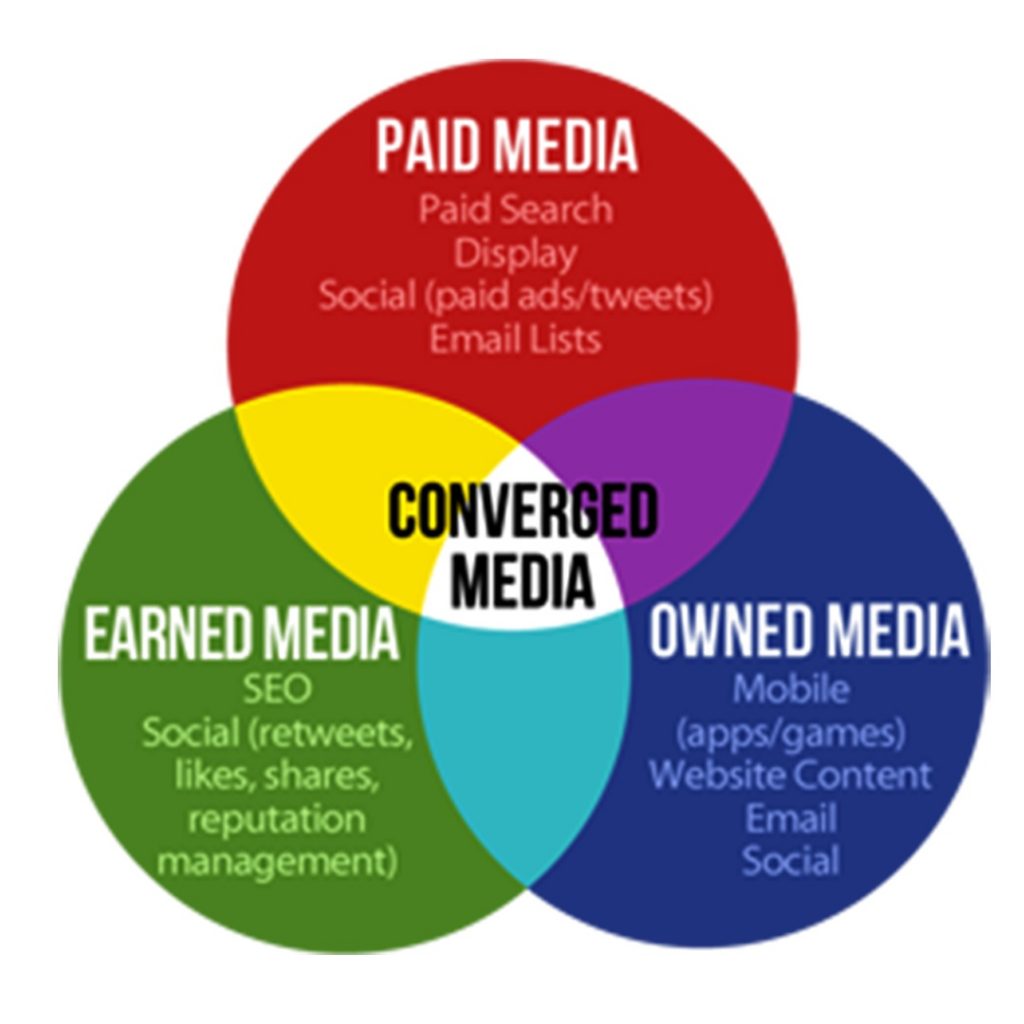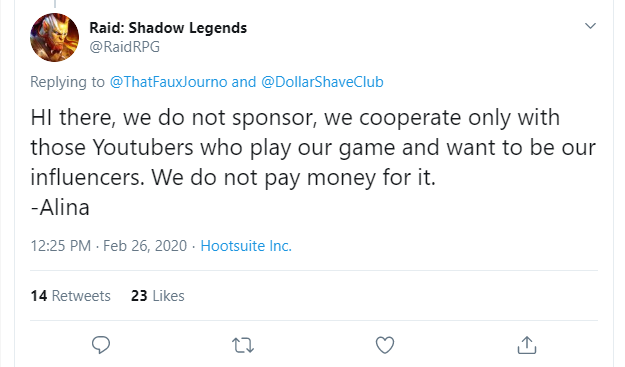Working with influencers, often called influencer marketing, is an important part of marketing a game. It is part of the paid media category of social media marketing alongside owned media and earned media. Influencers can be used to create buzz about your game that doesn’t come across as a company and instead feels more like organic conversation.
When we mention online influencers, we’re talking about YouTubers, Twitch streamers, Instagrammers, or other prolific users of any other social media platform with some sort of following, posting about your game online to their following or otherwise appearing to endorse your product, usually because they’ve received some sort of benefit in exchange for doing so. This can be great for a game developer, especially if you can find an influencer that covers your genre.

Influencer marketing is also a huge potential part of a marketing campaign. If you’ve spent any amount of time on YouTube, you’ve probably seen an advertisement for the mobile game RAID: Shadow Legends. This is because they’ve spent around $8.66 million on YouTube ads, paying an average of $4,190 for each time an influencer has plugged their game, despite claims that they don’t pay money for influencer advertising.
Despite not being direct advertising put out by your studio, influencer posting is still advertising, even when you don’t control everything being said by the influencer. As such, there are certain things you should be aware of when working with social media influencers to promote your game.
Who Makes Laws for Influencer Marketing?
Influencer marketing is advertising and video games are part of a global industry. As such, it’s important to be aware of applicable advertising laws around the world, not just in the jurisdiction where your studio is located.
In the United States, the FTC Act allows the Federal Trade Commission to set and enforce rules governing marketing and advertising. The FTC stated in 2020 that they would be taking greater action against misinformation that is “plaguing the digital economy” including “against popular brands […] disguising their advertising” through the use of social media influencers.
Similar to this, Canada has the Competition Bureau which enforces the Competition Act. It has taken similar action against businesses using social media influencers improperly. The United Kingdom has three different public bodies that regulate advertising and marketing, the Advertising Standards Authority, the Committee of Advertising Practice, and the Competition and Markets Authority.
While some jurisdictions don’t currently have as much regulation surrounding social media marketing, such as Japan which doesn’t require such posts to be labeled as an advertisement but may have cultural norms requiring such disclosure in certain situations, it is important to be aware of all relevant laws to stay compliant.
Are You Advertising While Using Influencer Marketing?
The first thing you need to know about social media influencers is when and where you might be advertising. After all, that’s when you’ll be subject to relevant regulations. After all, you’re probably not behind everything said about your game online. People praising and recommending your game is just a result of happy customers. Should one of those happy customers happen to be a social media influencer who chooses to post about your game you’re not working with the influencer, it’s just earned media.
However, when you’re working directly with an influencer who is producing conversation for you, you’re probably advertising. There’s a big difference between somebody talking about your game online because they liked it and your studio seeking the endorsement of an influencer. So what’s the difference? Where’s the line?
The FTC Act §255.5 gives us this line where somebody has to disclose their connection with your studio. It reads:
Where there exists a connection between the endorser and the seller of the advertised product that might materially affect the weight or credibility of the endorsement (i.e., the connection is not reasonably expected by the audience), such connection must be fully disclosed.
FTC Act §255.5
The key term here is the material connection. If the influencer has a connection to you, your studio, or your game that materially affects the credibility of their endorsement, they need to disclose that connection.
For example, payment exchanged for a post on their social media channels would affect the credibility of the influencer’s endorsement, since they’re being paid for it even if you don’t specify that it has to be positive.
On the other hand, your studio’s own channels, a developer for your project, or another person obviously connected to the studio posting about the game would be reasonably expected by the audience, so it likely wouldn’t need to be disclosed. The audience expects that connection.
A material connection goes beyond just paying an influencer and may be broader than you think. Free goods, such as a key for your game, qualifies as a material connection. The FTC recently warned board game publishers and content creators that they should be disclosing their relationships with publishers over free games given by the publisher, even absent any monetary compensation.
If this material connection exists between you and a social media influencer you are working with, you are engaging in advertising. Whenever you’re advertising, you’re subject to advertising regulation.
How Should Influencers Disclose Their Connections?
The second thing you need to know about working with social media influencers is how and when to disclose your relationship with them. While the burden here is generally understood to be on the influencer, you should still make sure that the influencer is aware of their obligation to avoid any legal troubles.
The FTC has put out guidelines on when and how influencers should disclose their relationship with advertisers. They’re worth going over if you have questions as to how an influencer should disclose a relationship with a developer.
Influencers should always disclose to their followers any material connection to the product, which includes any “financial, employment, personal, or family relationship with a brand,” especially if it’s not expected by their audience. This disclosure should happen even if they or you think that what they are saying is unbiased.
While there are relatively few hard rules with regard to how this disclosure should happen, the key point is that it should be obvious and clear. It should be part of the post itself rather than on the influencer’s profile page or in another location. If it’s a video, it should be part of the video and audio, not just in the description or in a text box on the screen.
In general, it’s better to disclose as much as possible. If the influencer got a free copy of the game, acknowledgement of this is a good idea. Likewise, if they were flown out to your studio to get an early look at the game, make that clear. Simple disclosures of a relationship such as hashtags like #ad and #sponsored can also be good.
It’s also important to know that nothing you do can prevent an influencer from disclosing their relationship with you. While you can have an NDA with an influencer preventing the disclosure of certain parts of the game or experience, nothing in an NDA can prevent the disclosure of their relationship to your studio, and any such part of an NDA will be unenforceable.

Likewise, although it is the influencer’s obligation to disclose their relationship with your game, you shouldn’t do anything that would imply that paid advertising is organic. Don’t say that these influencers just really liked your game when in reality you’ve paid them.
Staying Honest in Influencer Marketing
The third thing you need to know when working with influencers is how to stay honest. While you’re not personally giving the information in the influencer’s post, you need to make sure that you’re not placing restrictions or otherwise dealing with your influencer in a way that misrepresents your game.
Like with any form of advertising, you can’t lie even when working through an influencer. A lot of ways you should avoid being dishonest can be found in my article on being honest with video game trailers, with a few extra ideas specific to influencers. In short, make sure that any influencer endorsing your game is being honest about what is and is not part of your game, and make sure that any footage they use (whether you send it to them or not) is an accurate representation of your game.
Influencers shouldn’t endorse your game if they haven’t played it. While how much of your game they actually play is largely up to the influencer, you should make sure there’s ample opportunity for them to play it and form an opinion. This may be different in cases where a piece of content is only sponsored by your studio, and it is clear that they’re basically just reading an ad that you’ve provided.
Still, where an influencer is providing their opinion on your game – or is giving the impression to their audience that they are – then they should be giving their opinion as free of your restrictions as possible. Building a great game really helps in this regard, it’s easier for someone to say your game is great if it actually is.

Also, while influencers are a potentially valuable source of information since they can specialize in one particular type of game, influencers can’t call themselves experts, nor should you refer to them as an expert. The FTC has limits on who can be called an expert.
Conclusion
While working with influencers is a potentially valuable form of advertising, it comes with caveats. It’s important that you comply with regulations around the world and make sure that your relationship with an influencer stays honest. As with all advertising, don’t misrepresent your product, and don’t misrepresent your relationship with an influencer.

Leave a Reply